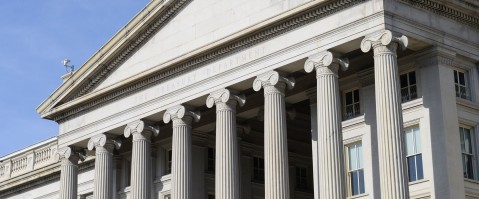
A new decade, different thinking
After a strong 2019, the momentum going into 2020 is positive
3 min read
Green shoots of the global economy are emerging but care is needed if they are to take root. As we look to the first quarter of 2020, we see two big factors influencing the direction of year ahead: ongoing central bank action and the US election.
Government and central banks could disrupt tradition
Three rate cuts from the US Federal Reserve in 2019 have given the global economy a boost to kick-start the next decade. It’s further evidence of how far central banks are willing to go to keep the world economy moving, and we’ve seen similar action taken by the European Central bank and the People’s Bank of China.
As we enter the 2020s, we believe that governments and central banks will attempt ever more forceful initiatives to shift economies out of the doldrums, and we could see creative and disruptive ideas coming into play. This could see some sectors directly impacted and the winners and losers of the 2010s swap places.
Brewing political populism and extremely low interest rates could mean that the argument against increased public spending or stimulatory tax cuts becomes politically awkward. Governments might be unable to avoid larger budget deficits while central banks will do their best to keep interest rates low for as long as possible.
A DEFINING YEAR FOR GLOBAL POLITICS
The US election will be the key political event in 2020. At stake is the political narrative over the fight against inequality that is at the heart of the more populist politics we have seen take centre stage in recent years.
“One way or another, a transition from reliance on high-carbon fossil fuels to carbon-neutral renewable energy sources will be a dominant theme in the coming decade. Just as the rise of the tech giants has dominated markets the last decade, we could see renewable energy innovators leading the way in the 2020s.”
For the Republicans, President Trump will continue to advocate a protectionist economy that supports local industries and jobs. This has consequences for the global economy, as his propensity for dramatic announcements on trade agreements and tariffs since 2016 has shown.
His opponents from the Democratic Party, meanwhile, will advocate higher fiscal spending or even policies that will aim to redistribute wealth, such as minimum wages, universal income and wealth taxes. These are less likely to influence global trade, but could have a substantial impact on the world’s largest economy.
Whichever side wins this argument, the result will have significant consequences for investors as the US remains the engine of global growth and sets the agenda for international economic debate.
Become a Client
When you become a client of Coutts, you will be part of an exclusive network.
Actively preparing for the years ahead
This environment of low interest rates and rapidly shifting asset valuations, coupled with geopolitical risk, calls for an active investment management approach in the next years. As professional investors, we have proactively prepared for this by increasing our resources and aligning the tools we use to the evolving market situation.

Actively preparing for the years ahead
This environment of low interest rates and rapidly shifting asset valuations, coupled with geopolitical risk, calls for an active investment management approach in the next years. As professional investors, we have proactively prepared for this by increasing our resources and aligning the tools we use to the evolving market situation.
Key Takeaways
- Green shoots of the global economy are emerging but need to be nurtured if they are to take root
- Economic growth will be particularly sensitive to stimulus provided by governments and central banks, so we will be paying close attention to policy announcements
- We are watching the upcoming US election carefully – the parties are sharply divided on economic policy and the outcome could have a big impact on global investment markets
When investing, past performance should not be taken as a guide to future performance. The value of investments, and the income from them, can go down as well as up, and you may not recover the amount of your original investment.


.jpg.rendition.375.260.jpg)






